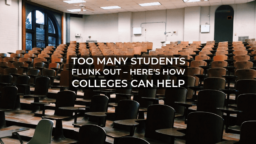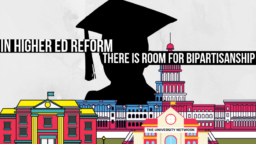-
Could Black Philanthropy Help Solve the Black Student Debt Crisis?
When billionaire Robert E. Smith decided to pay off the student loans of the graduating class of 2019 at Morehouse College, he suggested that others follow his lead. “Let’s make sure every class has the same opportunity going forward, because we are enough to take care of our own community,” Smith declared in his commencement… Read More
-
Poll: Climate Change Is the Top 2020 Issue for College Voters
College students view climate change as the most important issue in the 2020 election, according to a recent poll conducted by College Reaction and WBRU, an internet radio station based in Providence, Rhode Island. At first glance, this may come as a surprise, considering the state of student debt and the abundance of media coverage… Read More
-
Too Many Students Flunk Out – Here’s How Colleges Can Help
College has always been considered a vehicle for personal economic growth. If someone wants a good, high-paying job, they’re told to go to college. But those jobs are only attainable if students stay long enough to earn a degree. And, concerningly, only 58 percent of students who enroll in college earn their degree within six… Read More
-
Colleges Aren’t Preparing Workers for the Future, Survey Finds
As artificial intelligence increasingly threatens employment, few people believe higher education is effectively preparing current or future workers for the workforce, according to a poll conducted by Gallup and Northeastern University. The poll included the opinions of 10,000 adults living in the United States, the UK and Canada. Overall, Americans proved to be the most… Read More
-
Colleges May Force Students to Take Financial Literacy – and That’s a Good Thing
Across the board, college students lack financial literacy. To fix that, the federal Financial Literacy and Education Commission (FLEC) released a new report recommending that colleges and universities make financial literacy courses mandatory for every student. By forcing students to take such courses, the FLEC hopes to protect them from making poor financial decisions that… Read More
-
To Tackle Our Mental Health Crisis, Career Guidance Could Be Surprisingly Important
Being unemployed tends to be bad for your mental heath. We know this from long-term studies which show that people’s mental health often deteriorates when they become unemployed and can improve when they get a new job. It can be a vicious circle, since people with mental health difficulties can also struggle to get hired.… Read More
-
What Robots and AI May Mean for University Lecturers and Students
The number of robots around the world is increasing rapidly. And it’s said that automation will threatening more than 800m jobs worldwide by 2030. In the UK, it’s claimed robots will replace 3.6m workers by this date, which means one in five British jobs would be performed by an intelligent machine. Jobs in higher education… Read More
-
Forget GPA, Brands Are Prioritizing Students’ Passion in Their Scholarships
For decades, scholarships have helped students afford to go to college. And with student debt at an all-time high, they are needed now more than ever before. Until recently, however, nearly every scholarship has been reserved for those who are either athletically or academically accomplished. Even equity-based scholarships such as Chevron’s, which is strictly awarded… Read More
-
In Higher Ed Reform, There Is Room for Bipartisanship
As it does with nearly every political topic, U.S. mainstream media has attached partisanship to higher education. Recently, the overwhelming narrative surrounding higher ed has been that Democrats champion free college above everything, and Republicans refuse government involvement no matter the issue. However, results from a new national survey conducted by Third Way, a center-left-leaning… Read More
-
Low Internship Participation Indicates a Need for Change
In today’s rapidly evolving job market, having internship experience can give young job-seekers a tremendous leg up. In fact, 57.5 percent of new grads who were offered a job after graduation had at least one internship on their resume. But internships aren’t all created equally. While some companies adequately prepare interns for the working world… Read More
-
The Keys to a Successful Career – Advice From the Architect of SEO
Image Credit: Diggity Marketing In college, few questions carry as much weight as, “what are you going to major in?” This difficult question — imposed by parents, friends, and teachers, alike — pressures students to have a one-track mind. To find professional success, students are persuaded to pick a career path and stick to it.… Read More
-
If You Work in College, You’ll Make More Money After You Leave
Students who work while they’re in college will likely make more money after graduation than their classmates who choose not to work. That’s according to a new study published by the Education and Employment Research Center at Rutgers University. To conduct the study, researchers from Rutgers and the City University of New York (CUNY) analyzed… Read More
-
Poor & Minority Students Are Fueling College Enrollment, But There’s a Problem
College enrollment has increased tremendously over the past 20 years, “almost exclusively” due to a surge in low-income and minority students, according to a 2019 Pew Research Center study. The study found that out of the nearly 20 million undergraduate students in the 2015-16 academic year, 47 percent were “non-white” and 31 percent were in… Read More
-
With College Costs Skyrocketing, Why Still Go?
As graduating seniors unravel their freshly-printed diplomas, it’s hard for most of them to see anything but a huge bill. In recent years, skyrocketing tuition prices have forced 70 percent of college students to take out loans to pay for their education. On average, these borrowers graduate with $37,172 left to pay back. But despite… Read More
-
Are ‘Adversity Scores’ the Solution to Biased College Admissions?
The College Board has just revealed that it will attach an “adversity score” to every student who takes the SAT. That way, college and university admissions departments can better understand applicants’ social and economic backgrounds. Each SAT taker’s “adversity score” will be a number between one to 100. The scores are calculated by using 15… Read More
















